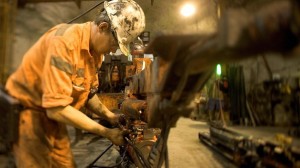Mining Careers Outlook
 A vast array of careers are available to workers with high school diplomas to advanced college degrees. High school graduates with technical and mechanical aptitude may become blasters, miners, or construction equipment operators and with considerable experience move into the ranks of management. Others work in clerical, sales, or transportation positions. Workers with advanced degrees have a wider range of options open to them in design, maintenance, sales, engineering, science-related fields, law, and management. A wide variety of engineers work in the design aspect of mining, including design, civil, electrical, mechanical, architectural, sanitation, and water supply engineers. Those with high-tech mechanical skills can work in maintenance, keeping mining machinery in top working order. These workers include mechanics, machinists, drafters, electricians, and instrumentation technicians. Those who have an affinity for science and laboratory work have important positions in the mining industry as chemists, petrologists, geochemists, surveyors, and various mining technicians. The mining industry also needs law professionals to address increasingly restrictive and complicated environmental and land use issues.
A vast array of careers are available to workers with high school diplomas to advanced college degrees. High school graduates with technical and mechanical aptitude may become blasters, miners, or construction equipment operators and with considerable experience move into the ranks of management. Others work in clerical, sales, or transportation positions. Workers with advanced degrees have a wider range of options open to them in design, maintenance, sales, engineering, science-related fields, law, and management. A wide variety of engineers work in the design aspect of mining, including design, civil, electrical, mechanical, architectural, sanitation, and water supply engineers. Those with high-tech mechanical skills can work in maintenance, keeping mining machinery in top working order. These workers include mechanics, machinists, drafters, electricians, and instrumentation technicians. Those who have an affinity for science and laboratory work have important positions in the mining industry as chemists, petrologists, geochemists, surveyors, and various mining technicians. The mining industry also needs law professionals to address increasingly restrictive and complicated environmental and land use issues.
In addition to major companies, there are countless small operators who specialize in various aspects of the industry, such as strip mining, stripping overburden, mineral analysis, drilling mine shafts, and helping companies comply with recently enacted federal environmental regulations that affect the industry.
According to the U.S. Department of Labor, employment in mining and quarrying is expected to decline by about 13 percent through 2014. There were 207,000 wage and salary jobs in the mining and quarrying industry in 2004; around 72,000 in coal mining; 27,000 in metal mining; and 108,000 in nonmetallic mineral mining.
Because the demand for energy, metallic, and nonmetallic minerals presently is low, opportunities for miners are expected to decline. While coal consumption is expected to increase, it will supply a smaller share of U.S. energy consumption as it is replaced by other renewable, more environmentally friendly sources. Recent regulatory strictures, such as The Clean Air Act Amendments (which went into effect in 1995), which aim to control environmental damage such as acid rain, mandate expensive compliance measures by coal-burning utilities, therefore affecting coal producers on the whole. Technological advances and labor-saving equipment have greatly reduced the number of production workers. For example, advances in longwall and surface mining and improvements in transportation and processing have increased productivity, but require fewer employees.
Continuing productivity increases also are expected to cause employment in the mining of both metals and nonmetallic minerals to decline through 2014— although employment in the mining of nonmetallic minerals will decline less significantly due to a continuing need for crushed stone, gravel, and cement for use in construction. The future outlook for metal mining varies depending on the material that is mined, but for all metals there will be increased competition from international markets. Mining operations in other countries have lower labor costs and are subject to fewer government regulations.
The Internet is expected to have an effect on the mining industry, since it provides access to a larger market of customers and suppliers. Localized mining operations will be able to find and communicate easily with low-cost suppliers, increasing efficiency. At the same time, the Internet will increase the competition among mining operations.
Related Career Fields:
Related Careers:
- Civil Engineering Technicians
- Civil Engineers
- Coal Miners
- Environmental Engineers
- Geological Technicians
- Geologists
- Geophysicists
- Groundwater Professionals
- Industrial Engineering Technicians
- Industrial Engineers
- Industrial Machinery Mechanics
- Mechanical Engineering Technicians
- Mechanical Engineers
- Metallurgical Engineers
- Mining Engineers
- Nuclear Engineers
- Oceanographers
- Petroleum Engineers
- Petroleum Refining Workers
- Petroleum Technicians
- Petrologists
- Soil Conservationists and Technicians
- Soil Scientists
- Surveying and Mapping Technicians
- Surveyors
